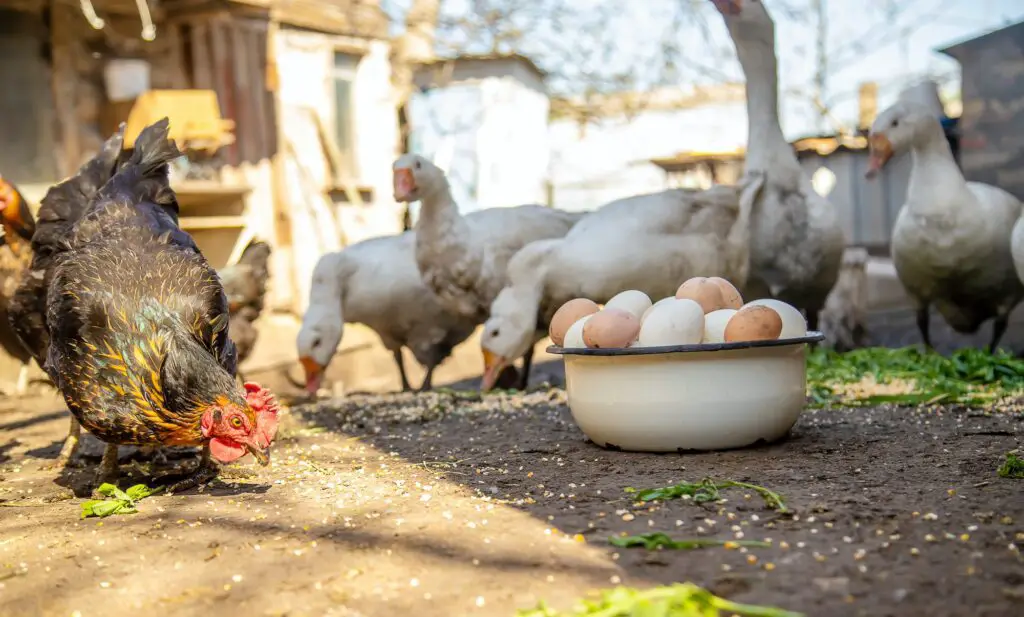When it comes to raising poultry, chickens are often the first choice for many families. They’re low-maintenance, affordable, and provide delicious eggs for various culinary purposes. Once you have some experience raising chickens, you may start considering other fowl to add to your backyard farm. Geese can be an attractive option, but can you raise geese and chickens together?
The short answer is yes, raising geese and chickens together is possible if you take certain precautions and create an environment conducive to harmonious living between the two species.
In this comprehensive guide, we will discuss the various factors to consider, the benefits of raising geese alongside chickens, and how to manage their unique requirements.

Space Requirements for Raising Geese and Chickens Together
One of the most critical factors to consider when raising geese and chickens together is the amount of space they need. Both species have different space requirements, and you must ensure they have ample room to roam and coexist peacefully.
During the day, both geese and chickens require space to roam around. Cramped conditions can lead to conflicts and stress among the birds. It is advisable to have at least 10 square feet of space per bird to allow for adequate territory and room for less dominant birds to avoid conflicts.
At night, chickens prefer roosting, while geese can sleep on the ground. Ensure your coop has enough space for chickens to roost comfortably and securely, and an area for geese to move in and out during the night.
Introducing Geese to Your Chicken Flock
Introducing geese to your existing flock of chickens should be a gradual process. Start by adding one or two geese and observe how the birds react to each other. To further ensure a smooth transition, you can create a small cordoned-off area in your backyard where the birds can see and smell each other without coming into close contact. This will give them time to adjust to the idea of living together.
Importance of Gender Balance in Mixed Flocks
If you plan on keeping male birds, it is essential to maintain a proper male-to-female ratio for both geese and chickens. This ensures harmony within the flock and prevents aggressive behavior due to competition for mates. On average, you should have about eight hens for each rooster and two or three females for each male goose (drake).
Benefits of Raising Geese and Chickens Together
Besides being beautiful and low-maintenance, geese can serve as protectors for your chicken flock. Geese are known for their protective nature and can deter smaller predators such as rats, rodents, weasels, and skunks from harassing your chickens. Additionally, they can serve as an early warning system against aerial predators like hawks, alerting your chickens to seek cover and stay safe.
Choosing the Right Breed of Goose for Protection
While all geese are territorial by nature, some breeds are more suited for guarding duties:
- African geese: These large, loud birds come in white and grayish colors and have a distinctive black knob at the top of their bill.
- Chinese geese: Similar to African geese but smaller and less bulky, they have a different knob shape at the base of their upper bill and come in brownish and white varieties.
- Roman geese: Small, white birds with a tuft of feathers on their head, Roman geese are known for their excellent watchdog capabilities.
- Pomeranian geese: Hailing from Germany, these noisy birds come in various colors, such as white, grey, saddleback grey, and saddleback buff.
Caring for Geese and Chickens: Differences and Considerations
While both geese and chickens are poultry, their care requirements differ in several aspects:
Water Requirements
Geese need to dip their entire beak in water to clear their nostrils, whereas chickens only need to dip the tip of their beak. Provide your geese with a water source deep enough for them to dunk their beak and head.
Feeding and Diet
Geese can survive on a foraged grass diet, while chickens require a more varied diet with grains and other feed. Ensure that both species have access to the appropriate food for their nutritional needs.
Housing and Bedding
Geese do not roost like chickens, so you will need to provide a safe, dry place for them to sleep at night. Ensure that your coop has adequate ventilation and appropriate bedding for both species.
Potential Challenges of Raising Geese and Chickens Together
While there are benefits to raising geese and chickens together, some challenges may arise:
- Geese can be territorial and aggressive: Geese may intimidate predators and alert you to potential threats, but they can also be aggressive towards people and other birds.
- Mating incompatibility: Male geese may attempt to mate with hens, which can be dangerous due to their size and anatomical differences.
- Geese may become aggressive towards chickens: In some cases, geese may attack or harass chickens, defeating the purpose of a guard goose.
Conclusion
Raising geese and chickens together can be a rewarding experience if you take the necessary precautions and provide the appropriate care for both species. By considering factors such as space requirements, gradual introduction, gender balance, and breed selection, you can successfully create a harmonious backyard farm with both geese and chickens.
Remember to closely monitor your flock’s dynamics and make adjustments as needed to ensure the well-being of your birds. With careful planning and management, you can enjoy the benefits of raising geese and chickens together and create a thriving, diverse backyard farm.








